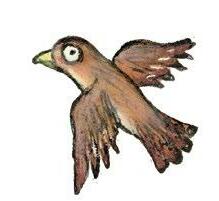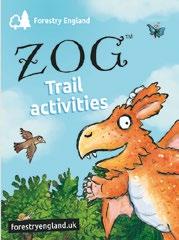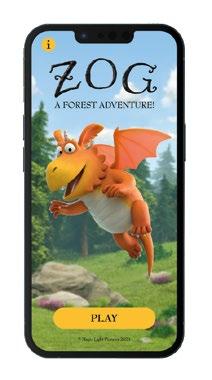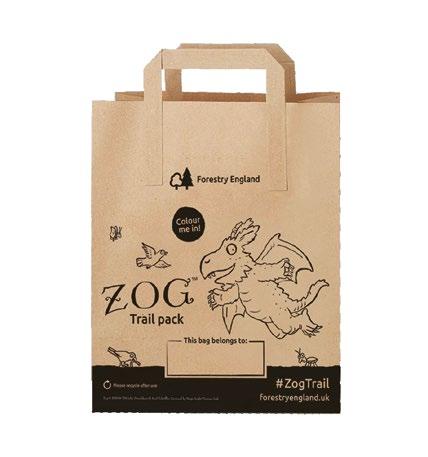Hampshire North







































Editor Rebecca Carr editor@familieshampshirenorth.co.uk 07789 882467
Sales Claire Clarricoates claire.clarricoates@familiespublishing.co.uk 07812 218331
Book now to be included in our March/April issue. Book by 3 February. We will feature all things Easter, holiday clubs, education and more.
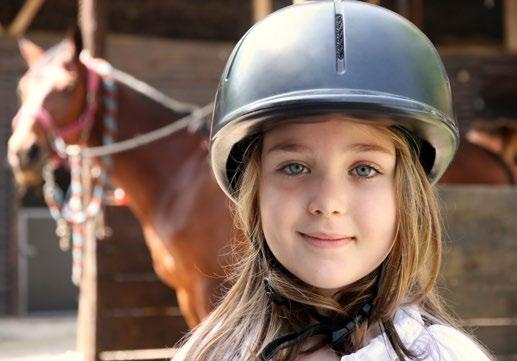

Congratulations to all our winners. You can find a list at https://bit.ly/SOrecipients
© Families Hampshire North 2023.
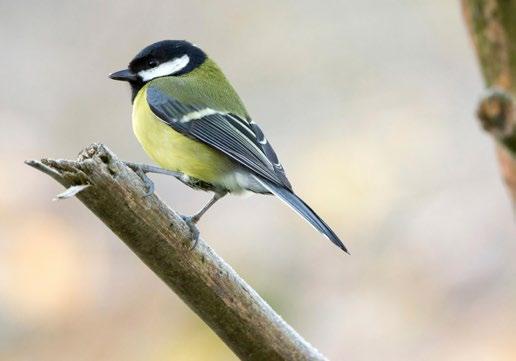
Families is a registered trademark of LCMB Ltd, Remenham House, Regatta Place, Marlow Road, Bourne End, Bucks SL8 5TD. The contents of this magazine are fully protected by copyright and none of the editorial or photographic matter may be reproduced in any form without prior consent of Families Print Ltd. Every care is taken in the preparation of this magazine but Families Print Ltd, its distributors, franchisees and LCMB Ltd cannot be held responsible for the claims of advertisers nor for the accuracy of the contents, or any consequences thereof.
Happy New Year from all of us here at Families! We wish you the very best for the months ahead.
If you’ve abandoned New Year resolutions already, then let Families re-inspire you! This really is a great time of year to focus on how to get healthier – but it’s difficult to do it on your own. So how about taking on a health challenge as a family instead and you can motivate each other? Whether it’s a new challenge, adopting strategies to alleviate anxiety or finding out why it’s healthy for kids to get muddy, this issue offers you lots of food for thought.
And, as the kids head back to school or nursery for the new term, we also have a great article on dealing with separation anxiety, as well as a focus on education including an update on SATS, advice on safely choosing an online tutor and why mentoring is important for your child.


Finally, in this issue, we have Britannica Magazine subscriptions to giveaway! Apply for six month subscriptions plus a Britannica All New Children’s Encyclopaedia inside. By doing so, you’ll also ensure you receive our digital magazine with lots more content and goodies on offer.
Enjoy the issue!
RebeccaEditor, Families Hampshire North
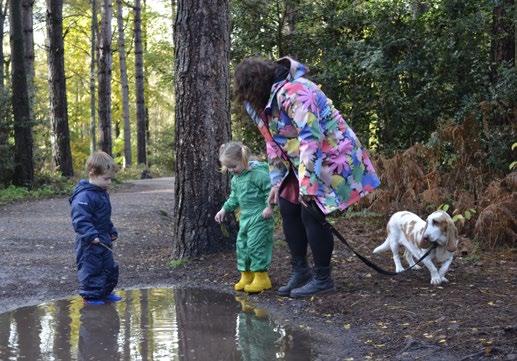
National Storytelling Week takes place from 28 January to 5 February and during this period, stories will be told in schools and theatres, pubs, museums, village halls, community centres and in many other places across the UK.
Speech and language therapists believe that storytelling is vital for children’s academic success as it promotes narrative skills and strengthens the ability of children to correctly sequence ideas. To be a good reader and writer a child needs firstly to be a good speaker and listener.

Above all though, storytelling is fun. Whether we are listening to someone else’s story or telling our own, inventing and adapting stories can open doors to exciting new worlds — both real and imaginary.
To find a local event, visit www.sfs.org.uk
Leading toy company, Fisher Price™ has teamed up with a leading support charity, Family Action, to launch the Family Action Play Programme for children ages 0 to 5 to help with their early childhood development.

The programme is available online and free to families and it shares early years expertise, practical tips and simple activities for families looking for quick and easy ideas to build play into the everyday and help their children thrive.
The programme includes five modules that tackle the ‘why’ and ‘how’ of play and its importance in early childhood development and has been developed drawing upon expertise from the Fisher-Price™ Play Lab and from the practice-based experience of Family Action staff.
Visit www.bit.ly/PlayProgramme to access the Family Action Play Programme.
Wear A Hat Day, an iconic and fun annual event, is one of the UK’s most popular and family-friendly charitable fundraisers and it’s happening again on Friday, 31 March!
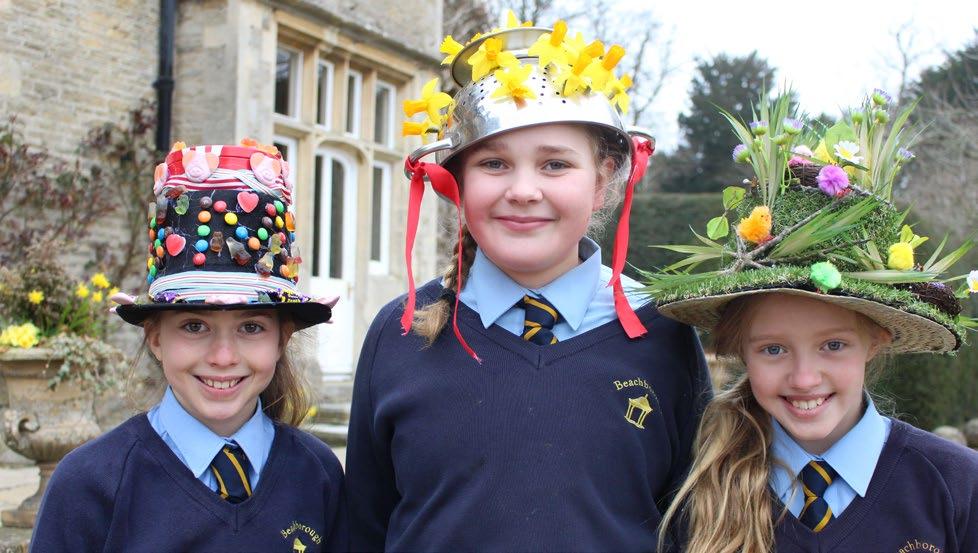
Running for more than ten years, this event raises millions for vital research into brain tumours – the biggest cancer killer of children and adults under the age of 40. Wear A Hat Day events help children explore their individuality and creativity, whilst learning to work together and think of others – in a really fun way.
Participation fosters friendships, creates better local and school communities, offers unique learning opportunities and provides new ways for children to explore ideas around different life experiences, all while giving hope to brain tumour patients and their loved ones.
Join this event, as a family or by persuading your local school to take part. Register now for more information and your FREE fundraising pack at www.wearahatday.org
Get your family involved in the RSPB Big Garden Birdwatch and help monitor bird life in the UK.
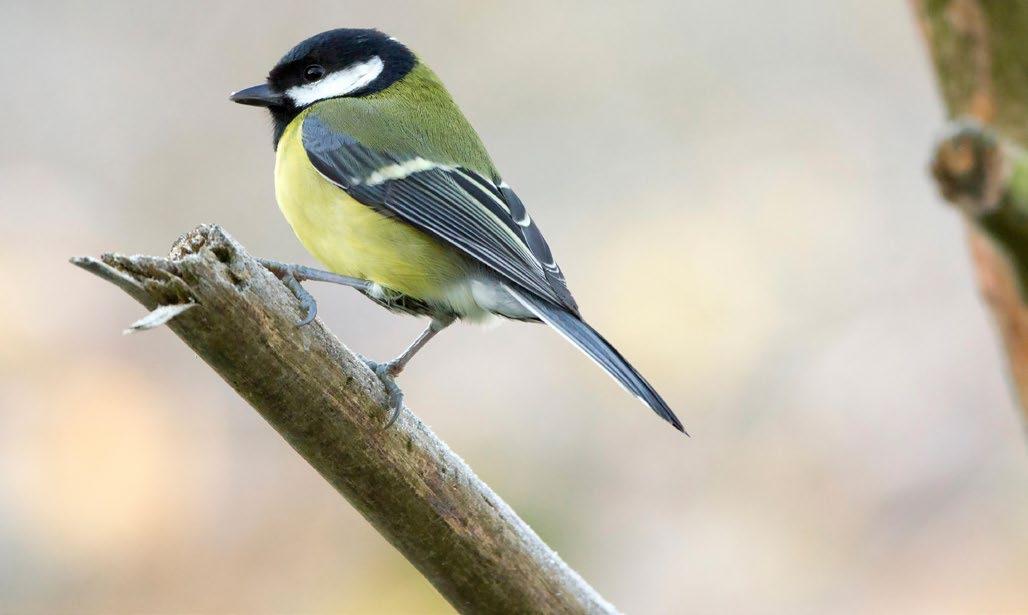
Simply count the birds you see in your garden, from your balcony or in your local park for one hour between 27 and 29 January.
Challenge your children to see who can spot the most birds. Take a bike ride to a local park or make a day trip out of it and spot birds in a new place.
You can also watch Big Garden Birdwatch Live! on YouTube and Facebook to discover what birds are being spotted across the UK with live commentary, interviews and chats with special guests and wildlife experts and the chance to ask them questions.
To learn about ways to attract birds to your garden and get your FREE guide, visit www.rspb.org.uk/birdwatch

Alton School is a happy co-ed Catholic School, Pre-school and Nursery for children from six months to Sixth Form.
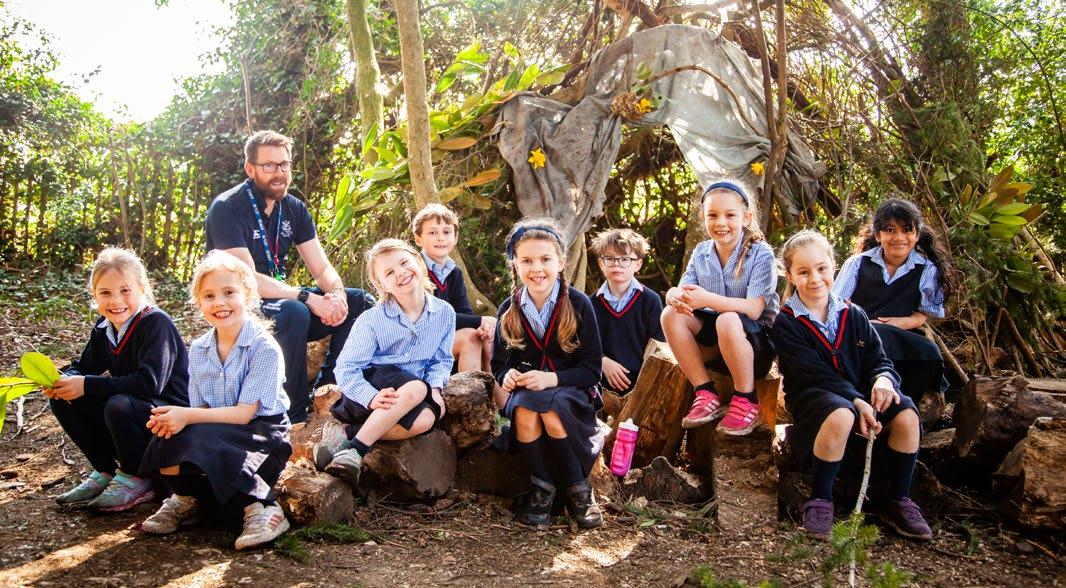
What sets Alton School apart? Some would say it’s their beautiful grounds, woodland walk and outdoor learning and play - so perfect for those early years. Others point to the sense of community you can feel. But if you are a parent looking for the best place to start your child’s education, it’s likely to be their inclusive and nurturing nature which stands out the most. Knowing your child as an individual and being able to spot their spark - these are the things that will make sure your child is supported and challenged every step of the way.
Please come and the School in action at an Open event on Friday 27 January, 9.30am for Pre-school and Lower School or Tuesday 7 February for a Taster Day for pupils joining Year 3 in 2023.
Register at www.altonschool.co.uk/admissions


Children aged 10 to 16 who are keen to extend their mathematical horizons can now take part in free weekly interactive maths sessions online called Maths Circles.

Maths Circles is a way for students to learn from some of the best maths educators in the world. The session contains a mix of challenging questions, puzzles and enrichment topics. The highly interactive sessions, with live chat and polling, also provide an opportunity to develop and practice the sort of problem-solving skills that are used to solve Primary Maths Challenge problems.
The initiative is the creation of Parallel, a charitable mathematics project founded and run by best-selling science author and maths educator, Simon Singh. The Maths Circles sessions are completely safe and secure - students do not appear on screen and cannot be heard and only the educators can see chat comments.

More info at www.parallel.org.uk
Kumon’s step-by-step approach to learning allows kids to develop strong maths, reading, and writing skills to reach their next academic level.

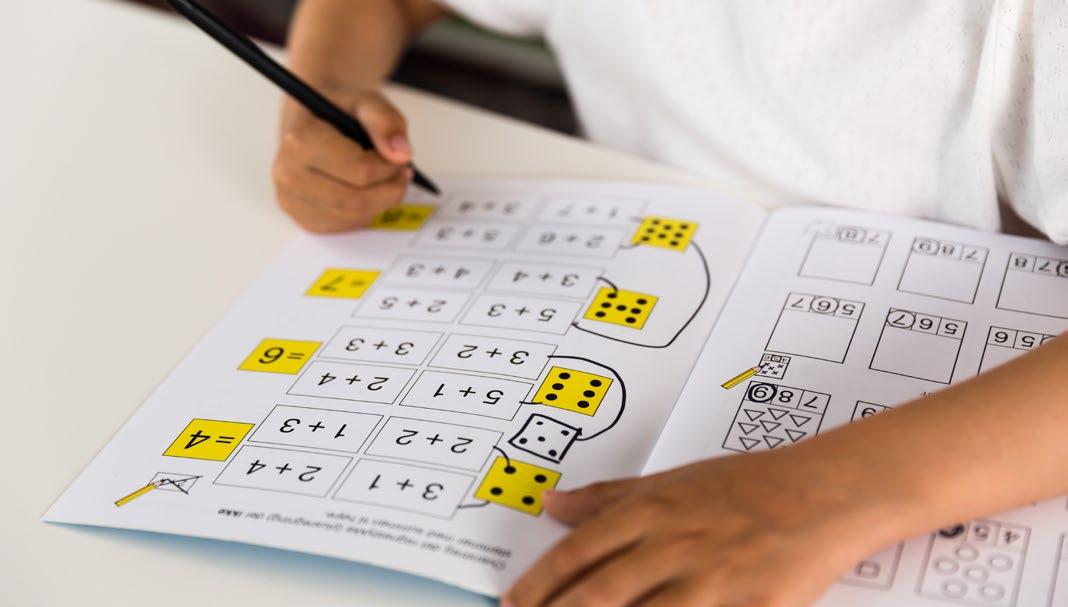
The benefits of Kumon are: Individualised instruction carefully planned for your child; Developing independent, self-learning skills; Academic progress in maths, reading and writing and it supplements the school curriculum. Most importantly, with Kumon, students learn how to learn - a skill that will last a lifetime!
Get started with Kumon today with a free assessment and free trial starting 1 February until 31 March 2023.
Contact Kumon to discuss and book an assessment. Local centres are available in: Basingstoke South, call 01256 533234 or Fleet, call 07498 243071.
Find out more at www.kumon.co.uk
In May, Year 2 (KS1) and Year 6 (KS2) pupils will take their SATS exams. Yet, from their very first day at school, children are being trained to be able to perform in preparation for these assessments.
So much work goes on behind the scenes in other years to get children ready and when it comes to the year in which they take their SATS, teachers are under pressure for them to do well.
To prepare for the exams, your children will be doing lots of maths, reading and writing at school, intertwined with other subjects so that they are consistently practising those skills. Sometimes this means that other foundation subjects are deemed ‘not as important’ and additional maths and English lessons squeezed in instead.
So how can you ensure your child does well in their SATS?

Your child’s school will more than likely be sending home maths, English and reading homework in preparation. It can be difficult to make your child do homework, especially when they have been worked so hard during the school day; however, it’s an important support in preparation for SATS so anything you can do with your child can really make a difference to how they perform.
Providing your child with any opportunity to read, write and do mathematical calculations will be massively appreciated by your child’s teacher!
In addition, you can download and look at past SATS papers from previous years (www.sats-papers.co.uk) to get an idea of what your child will have to do. There will be some things that have changed since you went to school so ask your child to show you how they do things - they will relish this opportunity!
Likewise, you can always speak to your child’s teacher who will happily show you how you can support your child’s learning at home.
As well as these things, ensuring your child eats well and stays hydrated will support their minds and bodies during the school day. Similarly, creating a good bedtime routine will mean your child gets a decent night’s sleep and has the brain power to be ‘on the ball’ throughout the school week.
Jessica Joan is a primary school teacher from Worcestershire with a ten year teaching career. After experiencing burn out, she set up as a Work/Life Balance Coach for stressed out teachers and launched her Happy Teacher Course. Find out more at www.jessicajoan.co.uk
It’s very common for children to feel worried and even stressed about doing their SATS, especially for Year 5 children going into Year 6. There is plenty that you can do at home to support your child mentally and emotionally in preparation. Explain that it’s totally normal to feel this way before a test and share some of your own experiences. This will help them feel less alone and comfortable in being able to share what’s going on for them. It’s a great opportunity for you to teach them about emotional intelligence and wellbeing. Start off by labelling the emotion that they are experiencing like anger, worry, anxiety. Then discuss the physical sensations they feel which come with that emotion, whether that’s sweaty palms or a racing heart. Now practise a wellbeing technique to promote feelings of calm and self-assurance during these times. Breathing techniques, exercise and meditation are all great ways to support your child’s wellbeing throughout stressful times during their childhood.

The government previously announced its plans to scrap KS1 SATS (Year 2) after the introduction of the Reception Baseline Assessment (RBA) which began in September 2021 and is taken by all new primary school pupils. However, it has since been decided to make KS1 SATS (Year 2) optional for schools from September 2023 instead.

The RBA is usually done with a teacher in an informal setting during a child’s first six weeks of school. It is an activity-based assessment conducted via a number of practical and interactive tasks. There have been pilots done all over the country and the validity report confirms that this new assessment provides an ‘accurate’ starting point from which to measure the progress a child makes in primary school.
To my knowledge, this change is welcomed amongst primary school teachers across the country as it limits the amount of pressured standardised testing that takes place during a child’s early school years. Primary school is a time for children to explore their learning through play and their own curiosities.
There are many different strategies which enable someone to ‘be the best they can be.’ In the adult world, the two commonly debated methods are coaching and mentoring. Whilst they are often discussed together, they are in fact two different concepts. As a mentor to teens and tweens, I have often found myself wondering if mentoring would work for primary aged children?
Some in the field of education may feel that mentoring is not appropriate for children of this age. How can you mentor someone who is just getting to grips with learning, formulating their ideas and their opinions?
However, mentoring can be very effective in instilling a love of learning, enabling open discussion and promoting self awareness at an early age. At its most simple, a mentor is ‘an experienced person who advises and helps somebody with less experience over a period of time’ 1. This period could be whilst a young child gets used to a new classroom or a change in family circumstances.
A mentor offers advice, using the benefit of their experience but always taking into account the fact that the child is an individual and that their background and experiences in life may be very different to that of the mentor’s.
Mentors do not have to be adults - instead, mentoring can be a peer-to-peer setup, with volunteer opportunities galore for schools to trial peer to peer encouragement and support techniques. Mentoring is about helping a child to recognise their true qualities and abilities, rather than moulding them into something that is not true to themselves.
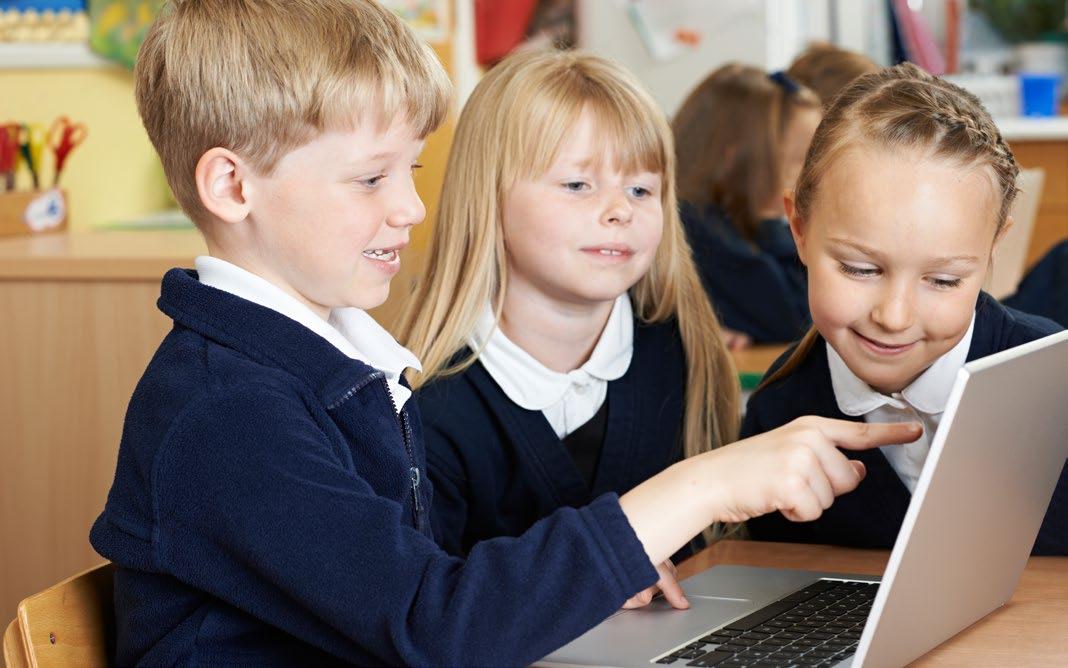
If a child is interested in sports, a good mentor will connect with them, using this interest, even if it isn’t necessarily a shared interest between them. A mentor guides but also allows a mentee to discover who they are.
Having a mentor or studying in an environment such as a classroom with a mentoring ethos can help children to get to know themselves and make sense of the world in which they find themselves.
In the age of social media, with an ever-increasing number of platforms telling children who they should be, I think mentoring is more important than ever to help children peel back the curtain and feel as if they have the permission to be their own person.
Jemma Zoe Smith is Director of The Education Hotel (www.educationhotel.co.uk).
1 Oxford Learner’s Dictionaries definition
Having a trusted person or group of people at school can help children to better manage their emotions.
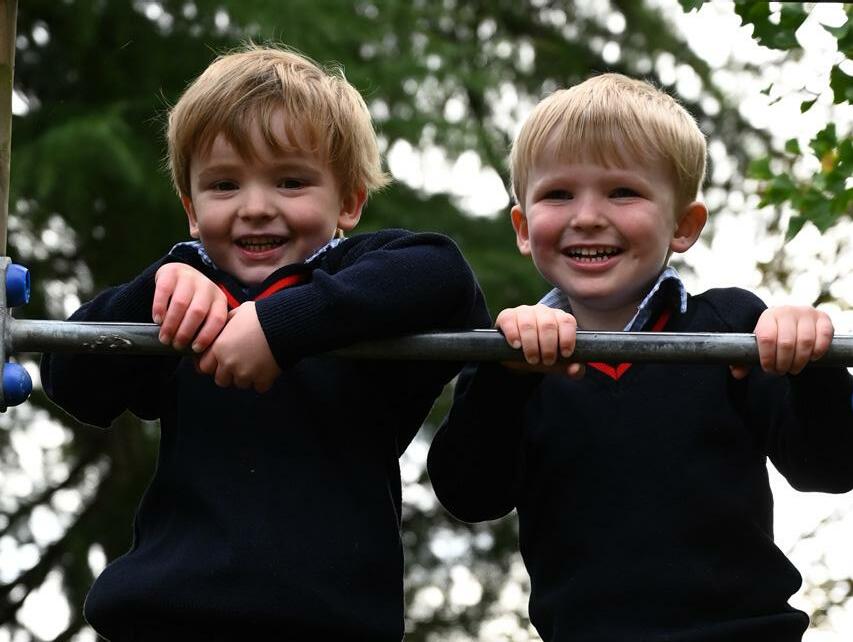
Anger and anxiety are big feelings for small children and can be difficult to process when they are not yet fully understood. Even if your child has a great role model at home, they might not see that person as relatable to their school life and so reaching out to their teacher about mentoring can be a great first step.
Most children will have a level of anxiety going into certain situations like tests and exams, leading them to ask themselves things like ‘what if I don’t do as well as last time?’ or ‘what if I’m not top of the class this time?’
Once a child has strategies to enable them to manage their emotions, this in turn will help them to build their self-esteem and improve their self-confidence. This can only have a positive impact when looking ahead to more important exams and other stress inducing times in a child’s life.
With Covid and the move to online platforms, tutoring has become more accessible, with more options and opportunities available for tutors and students. As a result, over fifteen percent of children across the country are now receiving private tuition.

An Institute of Education study shows that well delivered tuition has a positive impact on attainment across the board. Certainly, in the highly competitive worlds of selective schools and public exams, tutoring has become the norm in ensuring that children are prepared and supported.
Today many parents turn to the internet to find a suitable tutor as it offers wider and often less expensive access to more options. But with it comes the concern around finding quality teaching in an unregulated world.
Online tutoring options are prolific on social media - you’ll likely get more offers than you could sift through in one evening! There are also many specialist online agencies offering a range of tutoring options, as well as A-level or undergraduate student tutors offering their services.

Employing an A-level or undergraduate student tutor may be advantageous in
offering your child a positive role model.
Equally, your child may feel more comfortable with somebody closer to their own age and may therefore be more likely to challenge themselves and grow in their learning. This option can also offer a less expensive tuition route. However, it is really important to bear in mind that student tutors are unqualified and inexperienced and don’t have the experience or understanding of child development.
In this exploding world of online tutoring, to give your child the best chance to succeed, you will need to do your research AND practise due diligence. Paying for a tutor is an important investment and cutting corners may do your child more harm than good.
Most educators recommend a robust academic assessment prior to hiring any tutor. For some children, an experienced tutor will be essential whilst for others a student tutor to support their learning can provide a wonderful experience.

Either way, parents should be involved in what and how a tutor is planning for their child and have some degree of control and understanding of which topics will be covered.
A recommended element of the tutoring process is an academic assessment prior to beginning sessions. This is the process of gathering data to understand the strengths and weaknesses of a student’s learning. It should be tailored to the individual student and delivered by an expert educator. An academic assessment will:
• Test a child’s ability against the national cohort.
• Help parents understand the academic level their child is currently reaching.
• Identify gaps in learning, allowing tutors to create programmes tailored to your child’s needs.
• Reveal potential and determine if it’s being reached.
• Recommend suitability for future schools.
A robust assessment in advance of using the unregulated online world of tutoring will give you some degree of control and enable you to be more involved and aware of what your child needs in advance of hiring a tutor. It will provide a baseline for you to ensure that your child is being taught to a high standard.

Lisa and Catherine are co-founders of Emparenting (www.emparenting. co.uk), supporting children, parents and families with insights, skills and tools to nurture the development and well-being of the next generation.
Meet your online tutor in a video call prior to engaging them and check their references thoroughly.
Consider their professional training as well as their general character and attitude.
Request qualification certificates and background checks.
Ask how they measure progress. Request regular feedback and that any homework is sent via you.
Ask for planning information. A professional tutor will never mind sharing this with you.
Sessions should only be arranged via parents; tutors should never contact your child directly.
Which platform will they use? Make sure that your child knows the rules around safety too.
Monitor online lessons by setting up an open space in your home or leave a door open if you are not in the same room.
Trust your instincts as a parent; if something doesn’t feel right, stop sessions and change tutors.
It’s a common scenario; the toddler who actively resists being left with anyone else, struggling to separate from parents or loved ones. So what can you do to make separating from your toddler easier?

Most children go through a phase of being overly attached to one or both parents at some point in their early years. The tears can make leaving them at nursery or with a childminder heart breaking.

Kate Harding’s toddler would cling to her every morning when they arrived at nursery. ‘She wasn’t upset when she woke up in the morning or even in the car as we drove to her early years setting but once it was time for me to leave it was the same every day’ Kate says. ‘She would cling to my leg and literally have to be peeled off by one of the staff. Often I’d leave upset and in tears myself. On those days, no amount of reassurance from her key person that she was well and thriving would make me feel better.’
Experts say that it’s completely normal for young children to go through what could be described as a clingy phase and it’s an important part of their development.
For many, anxiety at being separated from a parent begins at six to nine months. It’s around this time that babies become conscious that they are separate little beings and are not the same person as their parent.
For some, this clinginess can last for a couple of years or more and can get worse when they go to nursery or a childminder.
As difficult as it is to be separated from a crying, anxious child, it’s best not to avoid leaving them. Explaining why you need to be apart, saying goodbye, telling them when you will be back and reinforcing the positives of this, is all part of teaching your child how to be resilient.

Take a deep breath and walk away. Your child is in safe hands and will thrive, as they will discover for themselves over time.
Kate says: ‘I would tell my daughter that I had to go to work so we had money and remind her how much fun it would be to play with her friends. Often this did the trick.’
Dorothy Lepkowska is an award-winning journalist, author and freelance writer for the Early Years Alliance (www. eyalliance.org.uk). You can read more of her parenting features at www.familycorner.co.uk
Nurseries and pre-school settings understand the importance of a settling-in period before your child starts officially. You might stay with your child for several sessions, gradually leaving them for longer periods. Your child’s key person will work with you to settle your child. This helps them get used to their new surroundings and helps you both become familiar with the staff and children.
Remember, this is all new for your child so it’s not surprising they might feel uncertain or anxious.
‘I always tried not to sneak out of the nursery when leaving’ says Kate, ‘but to give her a kiss, wish her a good day and wave through the window. At times it was hard to stay calm and collected while she was upset but as she got to know the routine the crying stopped. In any event, even at her worst, the staff always assured me that she calmed down once I’d gone and got on with the day’s activities. It was probably worse for me, in fact!’
Extra-curricular activities can boost your child’s confidence to interact socially with others, extend their social networks and provide your child with new skills and abilities. Above all, they offer an important space to have fun and relax away from the pressures of schoolwork.
Below we take a look at some popular activities and assess their key benefits for health and academic and personal development.
Health – you’ll find healthy benefits highlighted in BLUE. Academic development – these are highlighted in PURPLE. Personal development eg social skills, communication, concentration, confidence, respect for others, commitment –you’ll find these in ORANGE.
Ball sports are great for fitness but lesser contemplated advantages include:
• life skills - managing winning and losing, persistence, leadership, teamwork, making friends, improving selfesteem.
• physical health - this goes without saying.
• confidence – acquired as they master each incremental step.
For many adults, it’s a chore but it’s generally great fun for kids and laden with the opportunity to acquire important development skills:
• fine motor skills - mixing, rolling and using cooking implements.
• maths’ skills - measuring ingredients and understanding fractions, addition and subtraction.
• focus and attention to detail.
If your child can’t resist busting a move whenever music is the air, then dance classes may be a great way to channel that enthusiasm. The pay offs include:
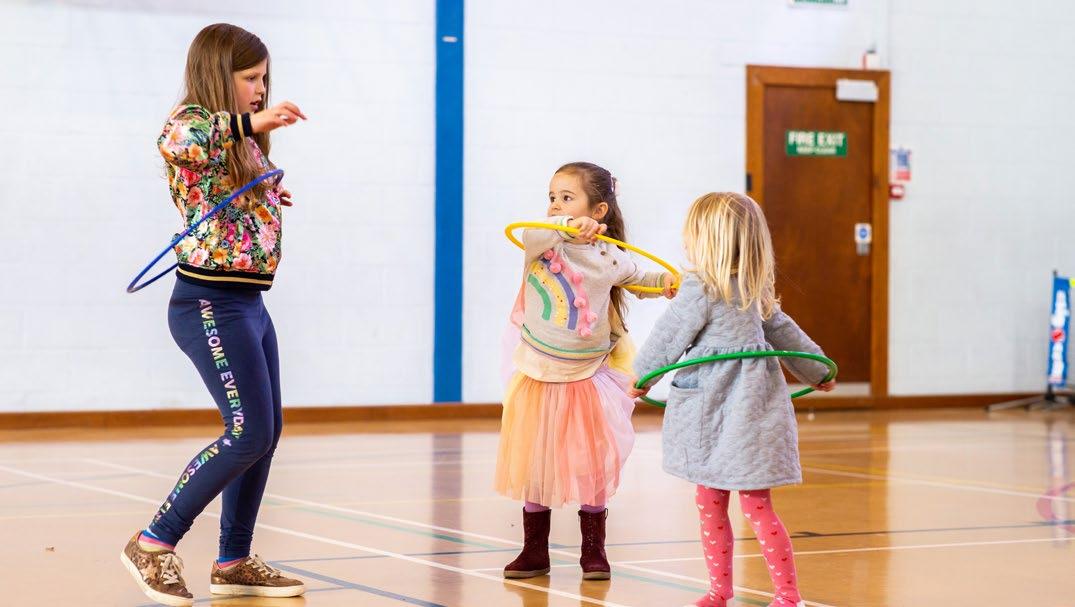
• physical health - flexibility, coordination, stamina, muscle strength and posture.
• dedication, self-discipline and focus.
• self-expression.
Whether you have a shy child or a natural performer, structured drama classes can have a wealth of benefits and develop:
• emotional intelligence.
• enhanced communication skills - vocal projection, articulation, listening and observation.
• confidence.
Learning to ride under proper guidance is very safe and offers your child lots of rewards:

• responsibility and accountability - through caring for an animal.
• mental health - coping with anxiety. Equine therapy is increasingly used for children with special needs.
• physical health - develops muscle strength, movement and co-ordination.
In general terms, the younger the mind, the easier it is to learn a second language. This can enable children to communicate with friends or family or when abroad. Other benefits include:
• improved school performance, better memory and problem-solving skills.
• improved career opportunities.
• better understanding of the world and other cultures.
Learning a martial art like judo or karate can have obvious benefits for physical fitness and strength but other advantages include:
• self-control, concentration and respect - central features of learning a martial art.
• burns excess energy and allows the release of frustration and anger in a non-violent way.
• physical health – a great full body workout!
Active Camps is an Ofsted registered premier childcare service, committed to providing high-quality school holiday multi-activity Active and Adventure Camps for ages 3 to 14.
Active Camps are hosting a camp from 13 to 17 February at Sherfield School, Hook. Book a place for your child today.
Each one of their camps is designed to use the stunning facilities available including: indoor and outdoor heated swimming pools, sports pitches, sports halls and indoor areas, many with access to acres of countryside.
Managed and run by outstanding teams who are DBScertified, including qualified teachers and sports coaches, children are encouraged to participate in all of the activities on offer.
To find out more visit www.active-camps.com
Stagecoach Camberley & Yateley offer fun, engaging, exciting Performing Arts classes designed for ages 4 to 18, with children split by age into small groups. No two lessons are the same as students enjoy experiencing a wide variety of performance skills and styles in dance, drama and singing.
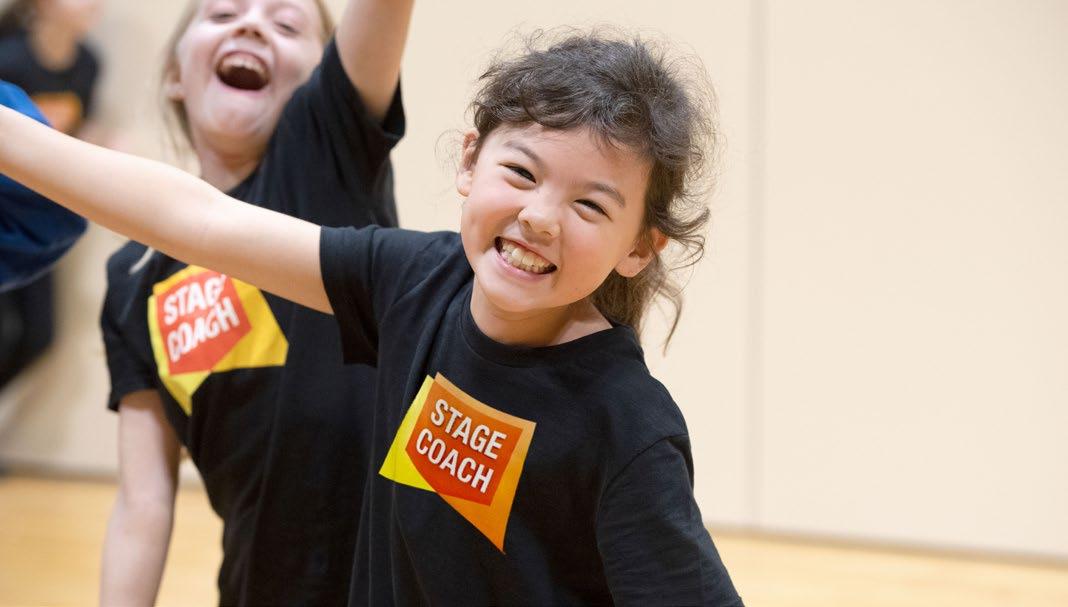
Students make friends, build confidence, work on shows for friends and family, with opportunities to perform in the West End and in local theatres- every child is encouraged to be the best version of themselves in a creative, happy environment.
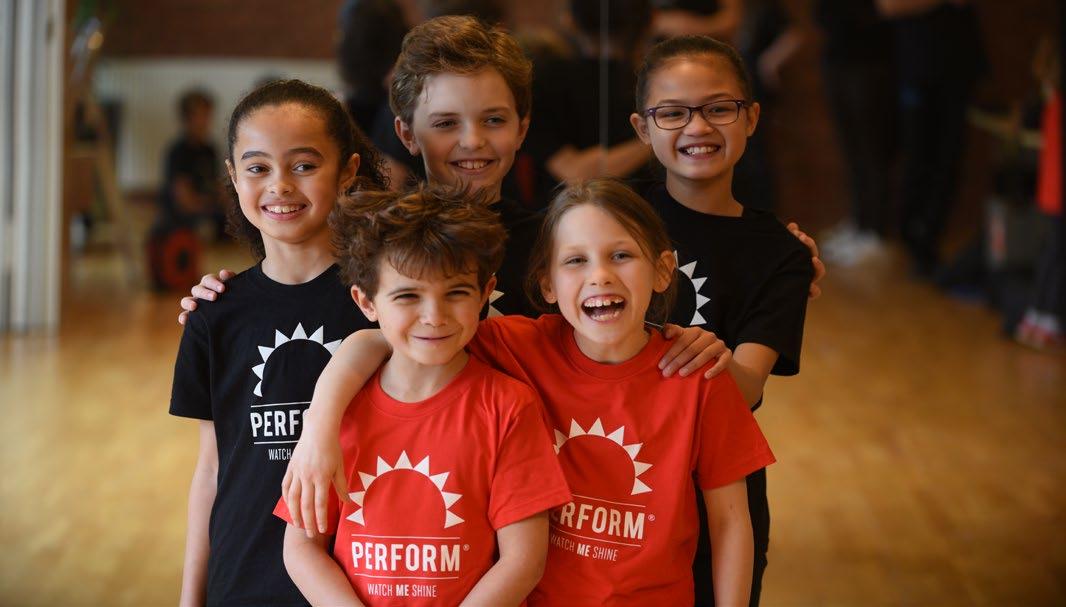
There is a two week trial for January 2023 available to try a class. These fun and friendly performing arts classes operate at Yateley School, Fridays 4.45-6.15pm (ages 4-6), 5-8pm (ages 6-18) and Saturday morning 9-10.30am/10.45am12.15pm (ages 4-6) and 10am-1pm (ages 6-18) at Kings College International School, Camberley.
Email camberley@stagecoach.co.uk to find out more.
Perform confidence-building classes are sure to blow away the winter cobwebs and will help children feel energised and inspired. This term sees 4-7s trapezing and somersaulting into a Circus Adventure whilst 7-12s work on a fun and funky adaptation of Robin Hood, in Outlaw. Imaginations will soar as children work towards a magical performance for family and friends.
Perform is not like other children’s drama schools. Its classes have a special emphasis on child development, using a mix of drama, dance and singing to bring out every child’s potential.
Run by experienced actor-teachers, Perform classes focus on developing the 4 Cs: Confidence, Communication, Coordination, and Concentration. With all abilities welcome, children can join at any point in the term and will take part in the performance. The only requirement is to get ready to have the best fun of the week!
More about Perform’s weekly classes
Confidence building weekly drama, dance and singing classes for 4-7s and 7-12s. Classes are designed to boost confidence, communication, concentration and coordination.
Children can try a FREE class at one of the following local venues
Andover: Andover Leisure Centre, SP10 1QP
Basingstoke: Beggarwood Community Centre, RG22 4AQ
Bramley: Clift Meadow Pavillion, RG26 5BH
Fleet: Zebon Community Centre, GU52 0ZE
Hartley Whitney: Victoria Halls, RG27 8RQ
Visit www.perform.org.uk/try, email enquiries@perform.org. uk or call 020 7255 9120 to book.
Are you looking to encourage and develop a love for sport in your child? Then why not try Saturday Sports Skills at Highfield and Brookham Schools in Liphook.
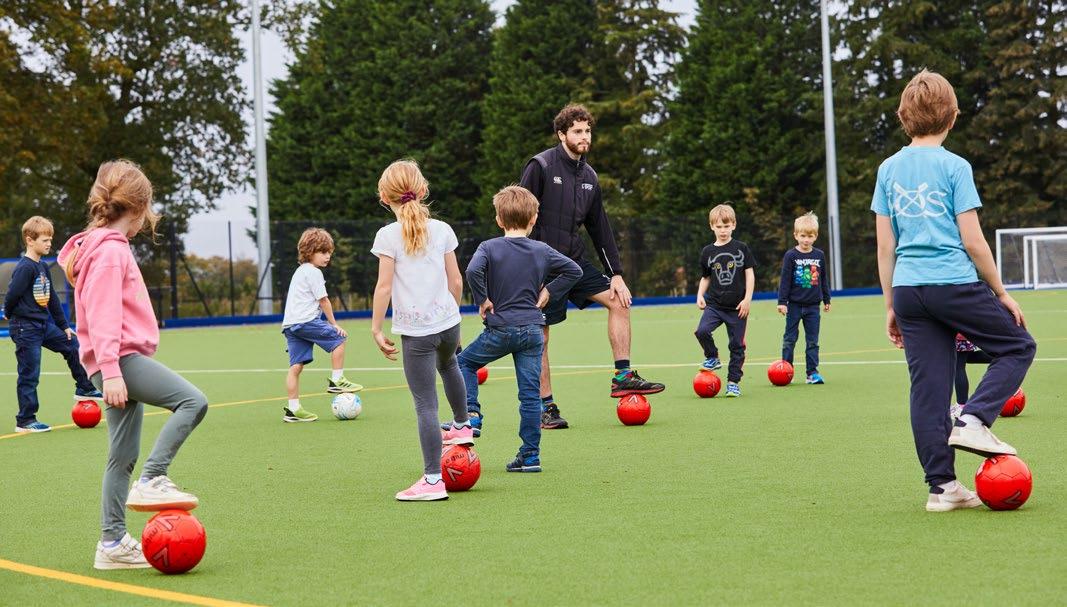
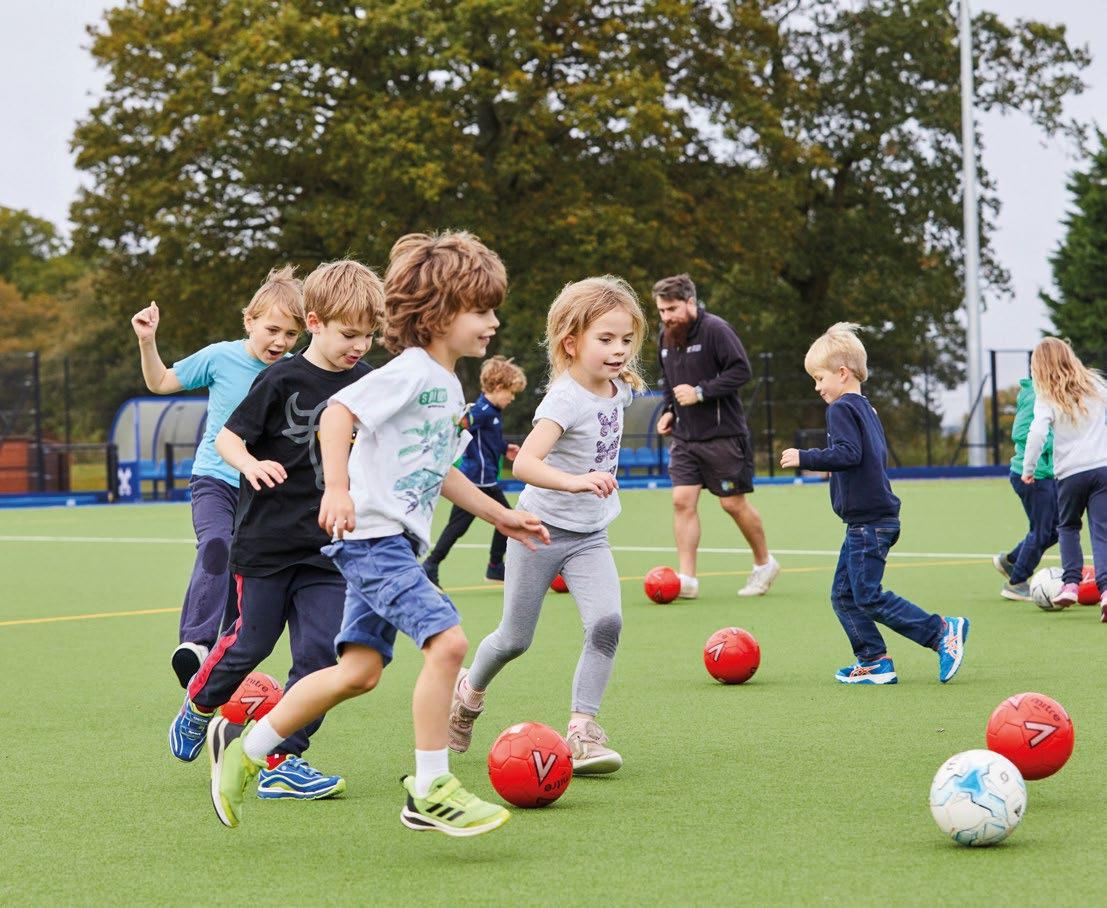
This fun and engaging multi-sports club is open to all children in school years 1 to 3. Children take part in a variety of different sports each week and develop key skills that nurture a lifelong passion for sport. Their approach encourages healthy competition and ensures your child flourishes in a safe and encouraging environment. Taking part in sport helps children both physically and mentally, building confidence and resilience, learning teamwork, respect for others and above all it's lots of fun!
Sessions run every term on Saturday mornings from 9.30am-12pm. Find out more at highfieldandbrookham. co.uk/Saturday-sports-skills
Is your child always making mud pies, splashing in muddy puddles and making friends with worms, leaves or sticks? Do you embrace it or hate it?
We all have those memories of getting messy and muddy as a child but when it comes to our children, it can be difficult to allow them free rein. Yet scientific evidence now suggests young children who are encouraged to enjoy safe, outdoor muddy play will go on to develop stronger immune systems than children who are discouraged from it, leading to better overall health.

In the last decade, over sanitised childhoods have contributed to higher cases of allergies in the western world1. The percentage of children diagnosed with allergic rhinitis and eczema has trebled over the last thirty years.
Meanwhile, other studies have also found children who grow up on farms, with easy access to farm animals and the outdoors have a lower risk of developing asthma2. The reason behind these findings is an immune system that is exposed to bacteria and viruses when young and becomes strong, meaning it is much less vulnerable to allergies and asthma.
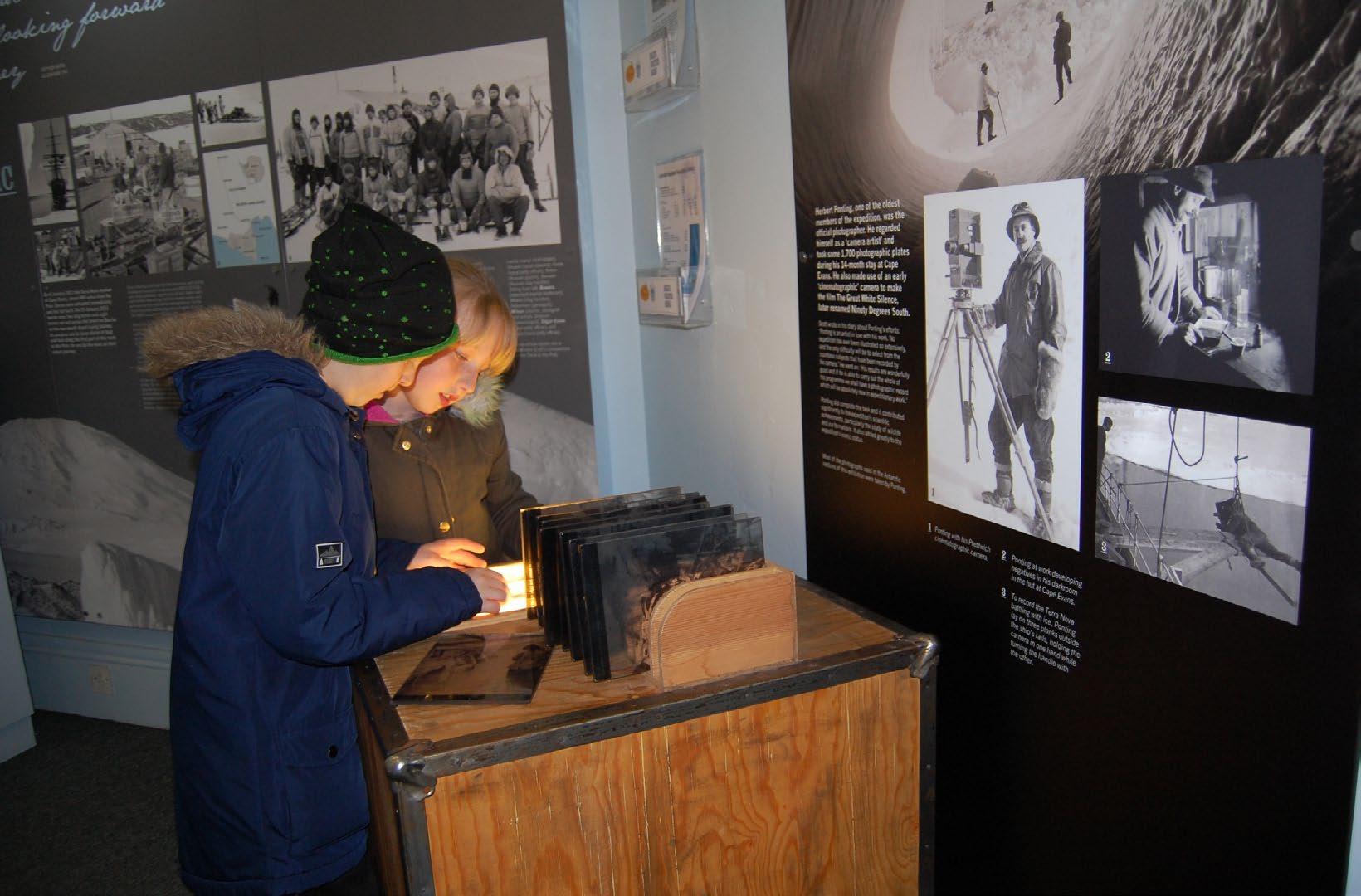
The best way is to get your child outside as much as possible, from as young an age as possible. Touch trees, leaves, grass and mud. Play with sticks, jump in puddles and breathe fresh air. Forest schools are now a popular alternative to traditional indoor nurseries and forest school activities run by Forestry England and the National Trust are increasingly common during the school holidays.
Locate your closest natural play area - playgrounds made from natural materials; some even have options for den building and mud kitchens. Not only are you giving your child’s immune system a boost but being in the fresh air has countless other physical and emotional benefits. Instilling a love of the outdoors from a young age will continue the healthy habit of getting outside.
You can also give young children regular exposure to safe bacteria through mud kitchens and gardening. This helps bolster their immune systems from an early age, contributing
to a more diverse range of bacteria in the gut and skin. Recent research has found a direct link between diverse microbes in a child’s gut and potentially chronic conditions like obesity, diabetes and even healthy brain development. If you don’t have access to a garden, consider a local allotment or community farm project where children learn about how our food is grown AND get their hands safely dirty.
Children who grow up with a pet, especially dogs, are also known to have a healthier immune system because of the dirt an animal naturally brings in. Use common sense with this though. Don’t play in muddy areas to which cats or dogs have regular access so you can avoid harmful bacteria your child may not be used to. Always wash hands with warm soapy water.
Messy and muddy play requires patience and a relaxed attitude – from you!
Don’t put children in their best clothes outdoors; a second-hand puddle suit and old wellies will suffice.
Don’t wait for a sunny day. If the weather isn’t perfect, remember, you need rain to create that mud.
Get involved yourself. Just because you’re an adult doesn’t mean you have to miss the fun and it might even help your immune system!
The saying ‘a little bit of dirt never hurt you’ really is true.
1 www.allergyuk.org/about-allergy/statistics-and-figures/
2 www.newscientist.com/article/2206654-microbes-from-farms-may-protectchildren-from-asthma-even-in-cities/

Mud paintings. Add some food colouring to watery mud and paint on patio slabs or paper.
Mud sculptures. Mould mud into shapes and add pebbles, twigs and leaves.
Den building or mud houses. Use sticks as a structure and mud to secure them.
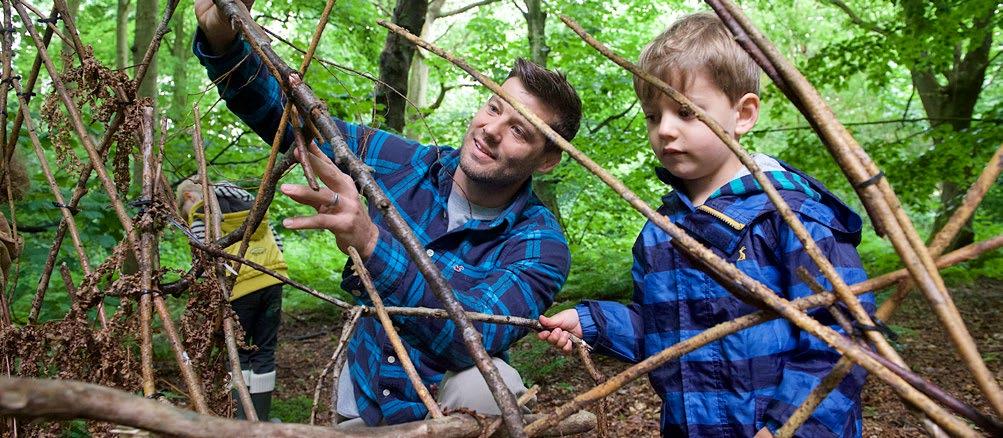
Mud towns. Get old dump trucks and plastic toy figurines to dig waterways and pour the water in.
And don’t forget some good old-fashioned splashing in muddy
Every New Year we are inundated with health, fitness and self-improvement messages. Often, if we do decide to challenge ourselves and make a change, we don’t feel adequately supported and quickly lose motivation. One way of addressing this is to take on a new challenge as a family. Not only do you all have to get up off the sofa but you get to spend quality time with each other too!
Does your family thrive on a bit of competition? You could make your challenge a goalorientated one. Or perhaps you have family members who want to nail screen time, healthy eating or exercise? Call a family meeting and decide which challenge will suit you all. If you can’t decide, hold a vote! Here are some challenge ideas.
We know that spending time in nature is good for you and science backs it up. Challenge each other to name different trees on every walk you go on, see shapes in clouds, identify birdsong; whatever it takes to draw the family into the fresh air.
The RSPB has some great wild challenge suggestions for families; check out fun and learning at www.rspb.org.uk
If you decide as a family to spend less time on devices, there are some great apps like AppDetox or AntiSocial which can help. Plan family fun as a healthier and more inclusive use of your time.


Coach Martin Sharp (www.martinsharp.com) suggests a family running challenge. ‘You could keep it simple and see how many laps of the park you can all do. But if you want to make it more exciting you could enter a Color Run (www.colorrun.co.uk) or a Tough Mudder (www.toughmudder.co.uk) says Martin. ‘Exercise doesn’t have to be the same thing day-in, day-out; with a bit of imagination it can turn into a grand adventure.’
Make a family chart and log everyone’s goals and achievements.

Bored with your normal meals? Inspire yourselves by researching healthy ingredients you’ve never tried before. Then plan a family challenge to cook meals from around the world. Everyone gets to try something they’ve not eaten before.

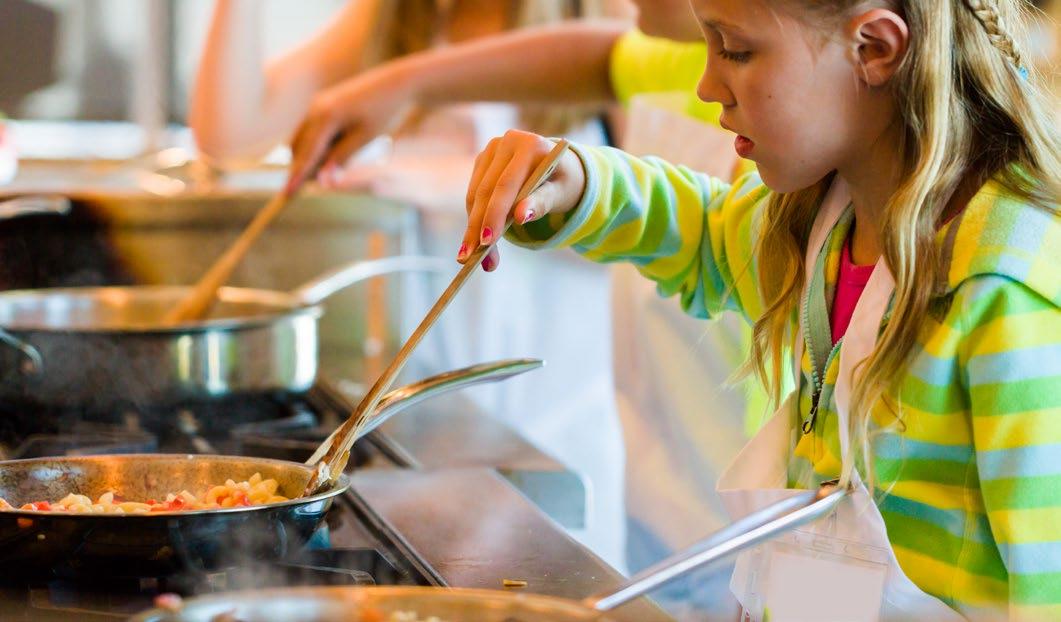
In this stressful world, taking time to ‘just be’ is so important. Try some relaxing yoga and meditation every evening for just five to ten minutes, for a month. Insight Timer (www.insighttimer. com) is a free meditation app, packed with different tracks and exercises.

Fitness expert Lauren Allen (www.strongasamum.co.uk) suggests using playing cards to mix up workout challenges. Allocate a movement or an exercise to each suit. For example, clubs is squats, spades is push-ups, diamonds is star jumps and hearts is high knees. Shuffle your deck and deal out the whole pack to everyone. The number on the card represents how many repetitions of the exercise you need to complete. Set a timer and whoever clears their hand in the quickest time wins the round.
Try a new activity that stretches the family’s comfort zone, such as ice skating, wild swimming, rock climbing or paddleboarding. Set yourself an achievable goal and get started!
Cook up your own version of Come Dine with Me, with the aim of making your meals healthier. Social media platforms are full of inspiring chefs whipping up feasts you can copy at home.
There is a pride and empowerment that comes with being in control of your money. What’s more, we can pass on this attitude and basic money management skills to our children and help them get money savvy too. With the rising cost of living, many of us are looking for easy and practical moneysaving tips. Here are some of my favourites.
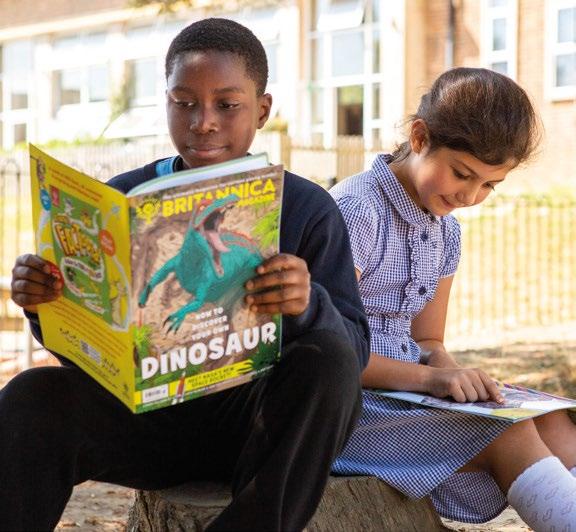

This winter, turn your central heating thermostat down by just one degree – it can save you up to ten percent a year on your bill.
Pop a tent or gazebo over your laundry line, it will allow the washing to dry without using the tumble dryer.
Turn off the radiators in the rooms you’re not in.
Is your bedroom cold? Switch on your electric blanket to get your bed warm; a forty watt electric blanket will warm up your bed for just two pence per hour.
Dig out your slow cooker. It costs ten pence per hour to use compared to your oven at fifty two pence per hour.
Free apps like Too Good to Go (www.toogoodtogo.co.uk) allow you to purchase unsold food at a big discount from top eateries at the end of service.
Invest in good-quality backpacks for days out so you and the kids can carry water bottles and snacks, rather than buying when you’re out.
Parking on days out can be expensive, so I use Your Parking Space app (www.yourparkingspace.co.uk). It tracks where you

are and finds cheaper parking alternatives.
Review your subscriptions. Is there anything you can do without?
Sell your unwanted items on eBay, especially clothing. Maximise your selling potential by ironing the items nicely and hanging them on matching wooden hangers. Always use the full free twelve photo allowance with close-ups of any logos. Photograph your items in natural light.
When travelling abroad, pack smart. Don’t buy sunscreen and essentials at the airport or a tourist destination as it will always be more expensive. Check for deals beforehand in high street stores and supermarkets. Also be sure to take medications like painkillers and sting and bite relief creams with you as these frequently cost much more aboard.
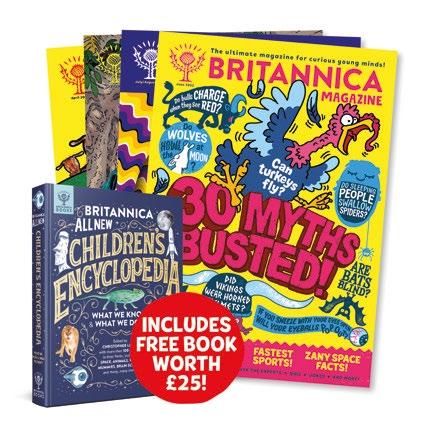
Gemma Bird, aka MoneyMum, is a social media sensation. She shares her practical and savvy money-saving tips on Instagram @moneymumofficial to help parents through economically challenging times.
Bulk out a meal like a spag bol with carrot so you use less meat.
Buy frozen veg so there is less waste and when buying fresh fruits and veg, buy loose where possible, as its cheaper.
Freeze leftover fresh fruit. A quick Google search will tell you which fruits do and don’t freeze well.
Grab a scanner at your local supermarket to keep track of your spending; make a shopping list and stick to it.
Consider switching to own brand items, especially for more expensive things like laundry detergent and dishwasher tablets. Go through what ingredients you already have and plan the week’s menu using these.
Join supermarket mailing lists and newsletters for great savings. There’s often money off your first online shop so sign up with all the stores that offer this. Then shop with a different one each week to maximise savings.
Sixty five percent of my followers said they would try this hack!

To promote your local event, nearly new sale, parenting courses or community group in the next issue, email editor@familieshampshirenorth.co.uk
Don’t forget to sign up for our digital magazine for more interactive content at familiesmagazine.co.uk/go
All listings correct at the time of going to print. Please check with the venue before visiting to ensure events are still going ahead and venues are open.
Every Tue Construction Club
Chineham Library, Basingstoke, RG24 8BQ
If you enjoy making things with Lego® and or Duplo® bricks, come along and enjoy the Construction Club. Parents and carers must remain with their children during the session. FREE.
Every Fri Storytime
Basingstoke Discovery Centre Festival Place, Basingstoke, RG21 7LS
Storytime for children aged 0-5 years. 10.30am. FREE.
Until 28 Jan
Out of This World! Space Race Toys
Petersfield Museum and Art Gallery, GU32 3HX www.petersfieldmuseum.co.uk
On display in the Museum Learning Space, experience a blast from the past with a presentation of over 20 original space-inspired toys, games, books and annuals. Kids go free.
Until 31 Jan Books and Brunch
Basingstoke Discovery Centre Festival Place, RG21 7LS
Join the free, weekly ‘Books and Brunch’ service for children ages 4-11yrs. Books will be selected for your child to take away and read and when you return them you will get a free brunch bag of food items for your child to take away.
Sat 28 Jan
Creative Saturday: Build with Bricks!
Petersfield Museum and Art Gallery, GU32 3HX www.petersfieldmuseum.co.uk
Come along and enjoy some brilliant brick building fun. There will be a LEGO® building challenge. 10am to 4pm.
Sat 28 Jan to Mon 20 Feb
Zero Degrees
Winchester Science Centre Winchester, SO21 1HZ www.winchestersciencecentre.org
The temperature may be dropping but things are heating up at Zero Degrees. As well as all the usual Science Centre fun, there’ll be even more on offer to excite all ages including Northern Lights experience in the Planetarium and Hands on Science Live demo, create a Cloud in a Bottle.
From 30 Jan ZOG™ Trail
Alice Holt Forest, GU10 4LS Everyone’s favourite dragon is returning to Alice Holt Forest with a
brand-new family activity trail and free app! Get ready to join Zog™ on his latest forest adventure to collect golden stars as your little dragons learn how they help care for the forest and how the forests can care for them. The new Zog™ trail launches on 30 January and runs throughout the year. There’s lots more to do at Alice Holt Forest at this time of the year, explore the trails and discover different play areas before treating yourself in the lovely café.
Wed 1 Feb
Mischief Makers: Museum Storytime Petersfield Museum and Art Gallery, GU32 3HX www.petersfieldmuseum.co.uk
Celebrate National Storytelling Week with a FREE Storytime event! 11am & 2.30pm.
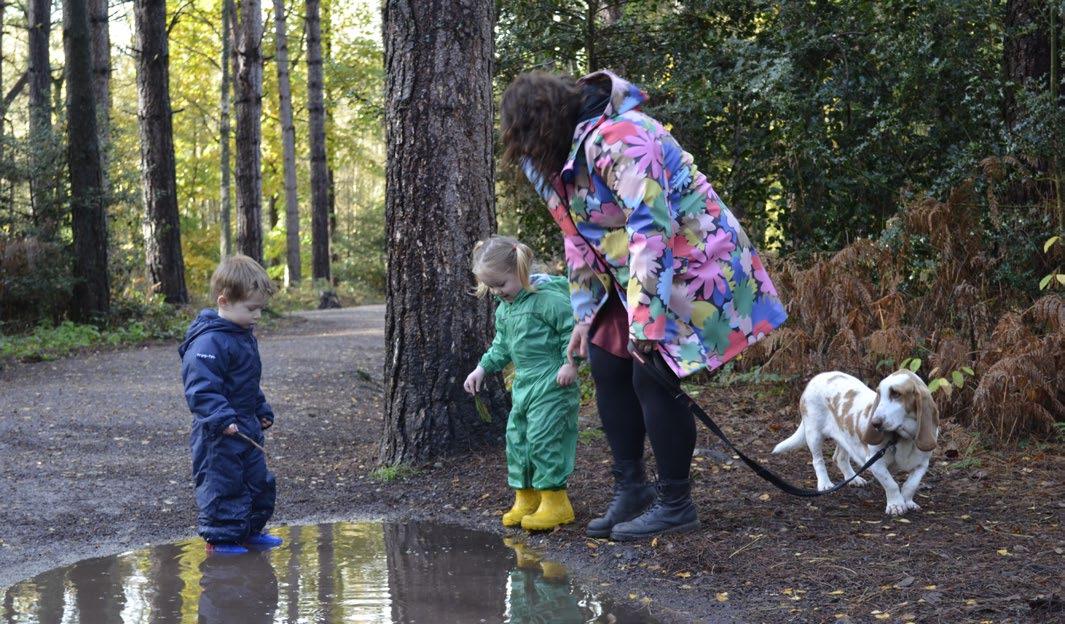
Sat 4 & 11 Feb
Paediatric First Aid Course Andover Library, SP10 1LT www.hants.gov.uk/ librariesandarchives
This is a course aimed at people with little or no first aid knowledge regarding children and babies. It is a great introduction to Paediatric first aid and this will give the learner skills to be able to respond to everyday first aid emergencies, in the home and in the community. On completion of the course an Ofqual accredited PFA certificate can be issued which is valid for 3 years. Pre-booking required.
Sat 11 and Sun 12 Feb Shark in the Park Corn Exchange Newbury, RG14 5BD www.cornexchangenew.com From the creative team behind The Hairy Maclary show and You Choose - see all 3 of Nick Sharratt’s Shark in the Park books live on stage! 1pm/3pm.
Sat 11 and Sun 12 Feb Room on the Broom Theatre Royal Winchester Winchester, SO23 8SB www.theatreroyalwinchester.co.uk Iggety ziggety zaggety zoom! Based on the best-selling book by Julia Donaldson and Axel Scheffler this production is a perfect introduction to the theatre for little ones. Find out in this magical show. Ages 3+.
Sat 11 and Sun 12 Feb Snowdrops Weekend Gilbert White's House, Selborne, GU34 3JH www.gilbertwhiteshouse.org.uk Wrap up warm and stroll through the gardens and grounds and enjoy snowdrops. 10.30am-4pm.
Sat 11 to Sun 19 Feb
Play Days: Games at the Museum Milestones Museum, Basingstoke, RG22 6PG www.hampshireculture.org.uk Enjoy fun and games at the museum! Play giant board games, take in the fun of the fair and enjoy traditional pub games in a fun-filled week for the family. 10am-5pm.
Tue 14 Feb
The Amazing Bubble Man Corn Exchange Newbury, RG14 5BD www.cornexchangenew.com Discover the magic, art, science and fun of bubbles with bubbleologist, Louis Pearl! 11:30am/2pm.
Tue 14 Feb
Mini Monet: Water Lillies West End Centre, Aldershot, GU11 3JD www.westendcentre.co.uk
In this arty activity, children and their parents are invited to explore the work of Claude Monet by recreating versions of one of his most famous works. Ages 5+, children must be accompanied. 10.30am-12.30pm.
Wed 15 Feb
Professor Slug’s House of Bugs West End Centre, Aldershot, GU11 3JD
www.westendcentre.co.uk
Professor Slug is an eccentric expert on invertebrates who helps bugs out with their buggy problems – and you can too! An interactive show packed full of colourful puppets, catchy songs and educational info about the world of bugs. Ages 3+, children must be accompanied.
Wed 15 to Thu 16 Feb
Model Mayhem
Aldershot Military Museum
Aldershot GU11 2LG www.hampshireculture.org.uk/ aldershot-military-museum Have a go at model soldier painting, take your finished soldier home and see if you can spot model soldiers on patrol in the museum cabinets. With support from Warlord Games. Suitable for ages 3+, children must be accompanied.
Fri 17 Feb
Sing-along Encanto
The Anvil, Basingstoke, RG21 7QR www.anvilarts.org.uk
Encanto, the smash-hit film musical that everyone can’t stop singing. Cheer on Mirabel as she tries to save the magic surrounding the Encanto, and sing your heart out with the live host, who will teach you some dance moves and show you how to use your free props bag. 1pm.
Fri 17 to Sat 18 Feb
Anglo-Saxon Takeover
Winchester City Museum, The Square, Winchester, SO23 9ES www.hampshireculture.org.uk
For two days, the museum is being taken over by Anglo-Saxons, who will be on hand to tell you more about what Saxon life was like, to demonstrate some of their skills, and to talk to you about some of the fascinating Anglo-Saxon artefacts in our collection. This is an exciting opportunity to get hands on with an assortment of historically accurate replicas of artefacts, whilst being guided by the very people who used them!
Tue 21 Feb
Fred The Cat's Magical Monthly Story Club - Dear Zoo
The Lights Theatre Andover, SP10 1AH
Fred the Cat's Magical Monthly Story Club is an exciting new club for ages 2 to 5. Pre-booking is advised. Fred is Amanda's gentle cat puppet who lives in a magic hat!



